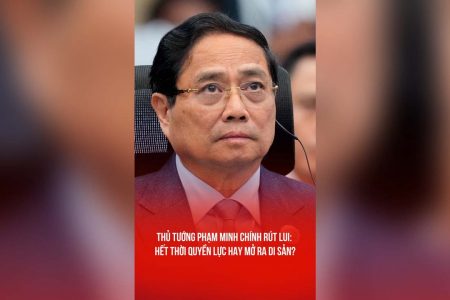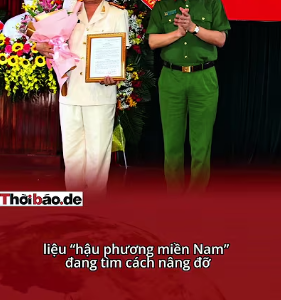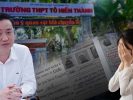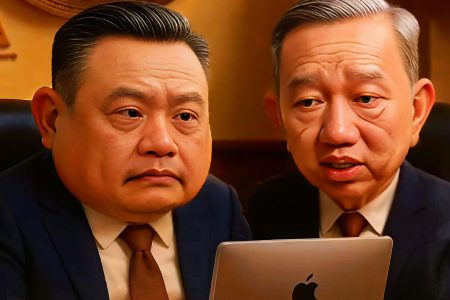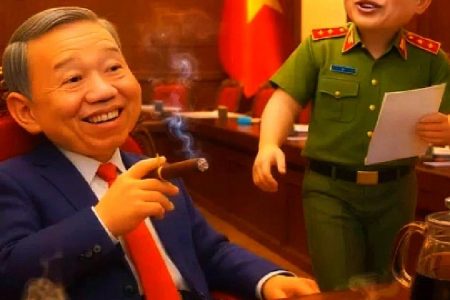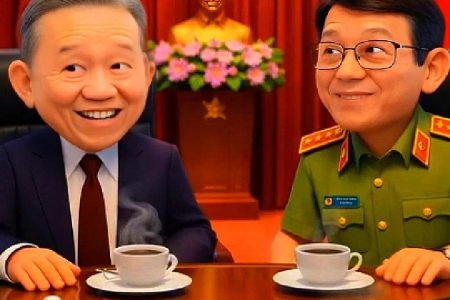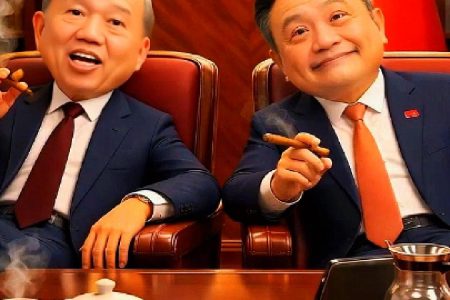
The case of model Ngoc Trinh, who was probed and detained by the police for 3 months, for disturbing public order in „cyberspace“ will become a dangerous precedent in the use of social networks in Vietnam.
Meanwhile, Vietnamese law up to this point still does not have any specific regulations on acts of „disturbing public order in cyberspace.“
According to public opinion, the nature of the case of probe and arrest of Ngoc Trinh is a continuation of the story of businessman Nguyen Phuong Hang and journalist Han Ni who were previously prosecuted and detained under Article 331 of the Criminal Code 2015.
They are all famous people, with fans reaching millions of people. Celebrities are the obsession and insecurity of the Vietnamese government.
In these days, controversy has arisen on social networks again, when people compare the police agency’s probe and arrest of model Ngoc Trinh, for dangerous motorbike driving, with the story of two brothers circus artists Giang Quoc Co and Giang Quoc Nghiep who rode a motorbike and „overlapping“ each other in an area of An Khanh ward, Thu Duc city, Saigon.
While Ngoc Trinh wore a helmet, the circus artists did not wear helmets, but also performed circus performances on the road, which was ten thousand times more dangerous.
Some people even compared and questioned why, with the same Ho Chi Minh City Police, they acquitted 4 Vietnam Airlines flight attendants of carrying more than 11kg of banned substances, while Ngoc Trinh, who was only driving, motor performance, they detained her for 3 months.
Another question that the public is wondering, asking the police to answer is whether the actions of circus artists Giang Quoc Co and Giang Quoc Nghiep are considered „disturbing public order” or not? And why has that violation occurred for many months and still has not been resolved, while Ngoc Trinh was arrested after only 10 days of violation?
There are many sarcastic comments saying „Don’t ask for „fairness, ones are ‘elite artists’ and the other is a ‘lingerie model,’ so how can they be treated the same way?“
Clearly, the comparisons just mentioned in the arrest of model Ngoc Trinh show that there is a „double standard“ application in handling traffic violations by the Traffic Police Department and the Ho Chi Minh City Police.
According to the definition, „Double standards are the same thing or action, but there are judgments and evaluations in many different directions, handling them according to whichever is beneficial and suitable for their purposes. Most people use to justify or rationalize one’s behavior and impose it on the other side.“
In the field of legal protection, the investigation and trial of cases, if „double standards“ are applied, it means, „two cases are similar, but are handled by different standards.“
Meanwhile, Article 16 of the Vietnam Constitution, amended in 2013, clearly states: „Everyone is equal before the law. No one shall be discriminated against in political, civil, economic, cultural and social life.”
The principle of equality before the law means that the state must ensure that everyone has equal status before the law, and has the right not to be discriminated against, expressed in all fields of social life; in enjoying rights and fulfilling obligations.
At the same time, Vietnamese law always affirms that people’s birth may be different in many aspects, including social status, but that is not a basis for the law to differentiate in legal responsibility. Any organization or citizen that violates the law will be handled with sanctions according to the provisions of law.
Is it true that, because of the Communist Party’s totalitarian regime – leaders are not elected by the people – so the Party has created special privileges to protect the people they want to protect?
According to observers, „double standards“ are applied many times in judging official corruption cases. And the fact that the defendants, who were former officials of the regime, were given „lighter“ sentences according to the law, and lighter than their accomplices who were civilians, has made public opinion extremely upset.
Thoibao.de (Translated)



